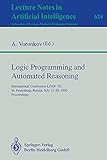Logic Programming and Automated Reasoning [electronic resource] : International Conference LPAR '92 St. Petersburg, Russia, July 15–20, 1992 Proceedings / edited by Andrei Voronkov.
Material type: TextSeries: Lecture Notes in Computer Science, Lecture Notes in Artificial Intelligence ; 624Publisher: Berlin, Heidelberg : Springer Berlin Heidelberg, 1992Description: XVI, 516 p. online resourceContent type: text Media type: computer Carrier type: online resourceISBN: 9783540472797Subject(s): Computer science | Artificial intelligence | Logic, Symbolic and mathematical | Computer Science | Mathematical Logic and Formal Languages | Artificial Intelligence (incl. Robotics) | Mathematical Logic and FoundationsAdditional physical formats: Printed edition:: No titleDDC classification: 005.131 LOC classification: QA8.9-QA10.3Online resources: Click here to access online
TextSeries: Lecture Notes in Computer Science, Lecture Notes in Artificial Intelligence ; 624Publisher: Berlin, Heidelberg : Springer Berlin Heidelberg, 1992Description: XVI, 516 p. online resourceContent type: text Media type: computer Carrier type: online resourceISBN: 9783540472797Subject(s): Computer science | Artificial intelligence | Logic, Symbolic and mathematical | Computer Science | Mathematical Logic and Formal Languages | Artificial Intelligence (incl. Robotics) | Mathematical Logic and FoundationsAdditional physical formats: Printed edition:: No titleDDC classification: 005.131 LOC classification: QA8.9-QA10.3Online resources: Click here to access online  E-BOOKS
E-BOOKS
| Current library | Home library | Call number | Materials specified | URL | Status | Date due | Barcode |
|---|---|---|---|---|---|---|---|
| IMSc Library | IMSc Library | Link to resource | Available | EBK6035 |
Soundness and completeness of partial deductions for well-founded semantics -- On deductive planning and the frame problem -- On resolution in fragments of classical linear logic (extended abstract) -- A procedure for automatic proof nets construction -- Free logic and infinite constraint networks -- Towards probabilistic knowledge bases -- Two-level grammar: A functional/logic query language for database and knowledge-base systems -- Extending deductive database languages by embedded implications -- Controlling redundancy in large search spaces: Argonne-style theorem proving through the years -- Resolution for many-valued logics -- An ordered theory resolution calculus -- Application of automated deduction to the search for single axioms for exponent groups -- Elementary lower bounds for the lengths of refutations -- Shortening proofs by quantifier introduction -- Reform compilation for nonlinear recursion -- Pruning infinite failure branches in programs with occur-check -- The use of planning critics in mechanizing inductive proofs -- ??-Calculus: An algorithmic interpretation of classical natural deduction -- Building proofs by analogy via the Curry-Howard Isomorphism -- On the use of the constructive omega-rule within automated deduction -- OR-parallel theorem proving with random competition -- Parallel computation of multiple sets-of-support -- Towards using the Andorra Kernel Language for industrial real-time applications -- Unification in a combination of equational theories with shared constants and its application to primal algebras -- Non-clausal resolution and superposition with selection and redundancy criteria -- Relating innermost, weak, uniform and modular termination of term rewriting systems -- A two steps semantics for logic programs with negation -- Generalized negation as failure and semantics of normal disjunctive logic programs -- General model theoretic semantics for Higher-Order horn logic programming -- Disjunctive deductive databases -- Netlog — A concept oriented logic programming language -- From the past to the future: Executing temporal logic programs -- Computing induction axioms -- Consistency of equational enrichments -- A programming logic for a verified structured assembly language -- The unification of infinite sets of terms and its applications -- Unification in order-sorted type theory -- Infinite, canonical string rewriting systems generated by completion -- Spes: A system for logic program transformation -- Linear Objects: A logic framework for open system programming -- ISAR: An interactive system for algebraic implementation proofs -- Mathpert: Computer support for learning algebra, trig, and calculus -- MegaLog — A platform for developing knowledge base management systems -- SPIKE, an automatic theorem prover -- An application to teaching in logic course of ATP based on natural deduction -- A generic logic environment -- ElipSys A parallel programming system based on logic -- Opium — A high-level debugging environment -- An inductive theorem prover based on narrowing -- A cooperative answering system -- MIZ-PR: A theorem prover for polymorphic and recursive functions -- ProPre A programming language with proofs -- FRIENDLY-WAM: An interactive tool to understand the compilation of PROLOG -- SEPIA — a Basis for Prolog extensions -- The external database in SICStus Prolog -- The KCM system: Speeding-up logic programming through hardware support -- Logician's Workbench -- EUODHILOS: A general reasoning system for a variety of logics -- The EKS-V1 system -- CHIP and Propia.
This volume contains the proceedings of LPAR '92, the international conference on logic programming and automated reasoning held in St. Petersburg in July 1992. The aim of the conference was to bring together researchers from the Russian and the international logic programming and theorem proving communities. The topics of interest covered by papers inthe volume include automated theorem proving, non-monotonic reasoning, applications of mathematical logic to computer science, deductive databases, implementation of declarative concepts, and programming in non-classical logics. LPAR '92 is the successor of the First and Second Russian Conferences on Logic Programming held in 1990 and 1991, respectively, the proceedings of which were publishedin LNAI Vol. 592.


There are no comments on this title.